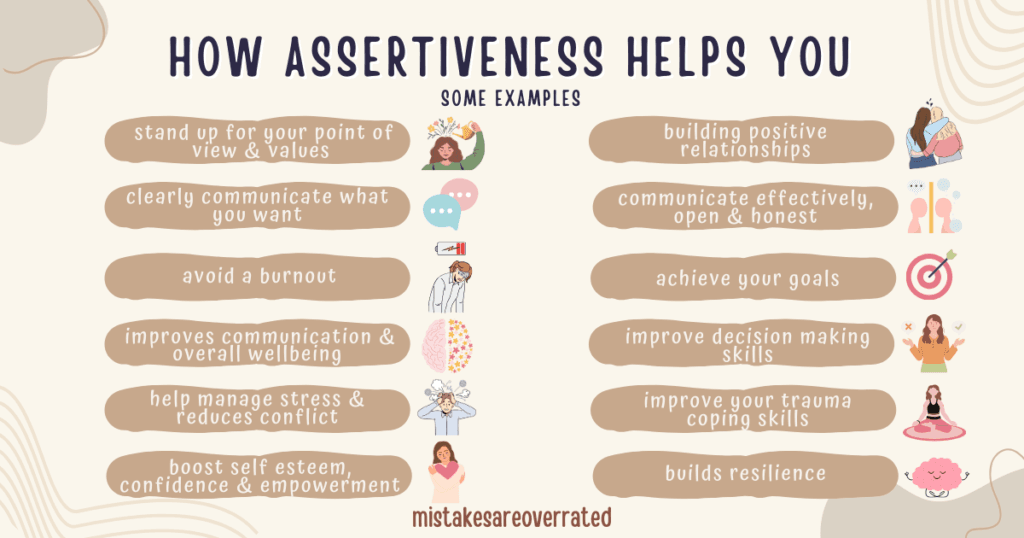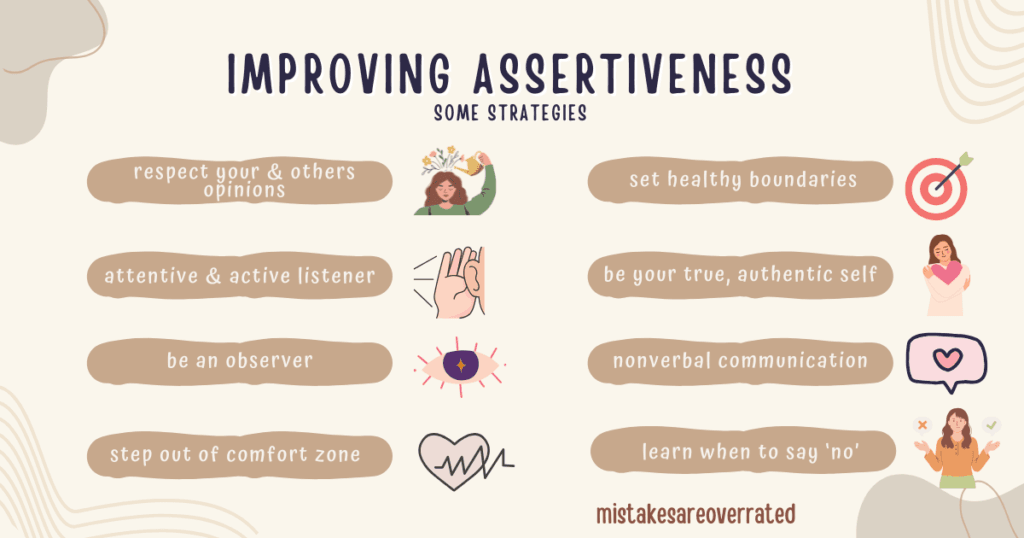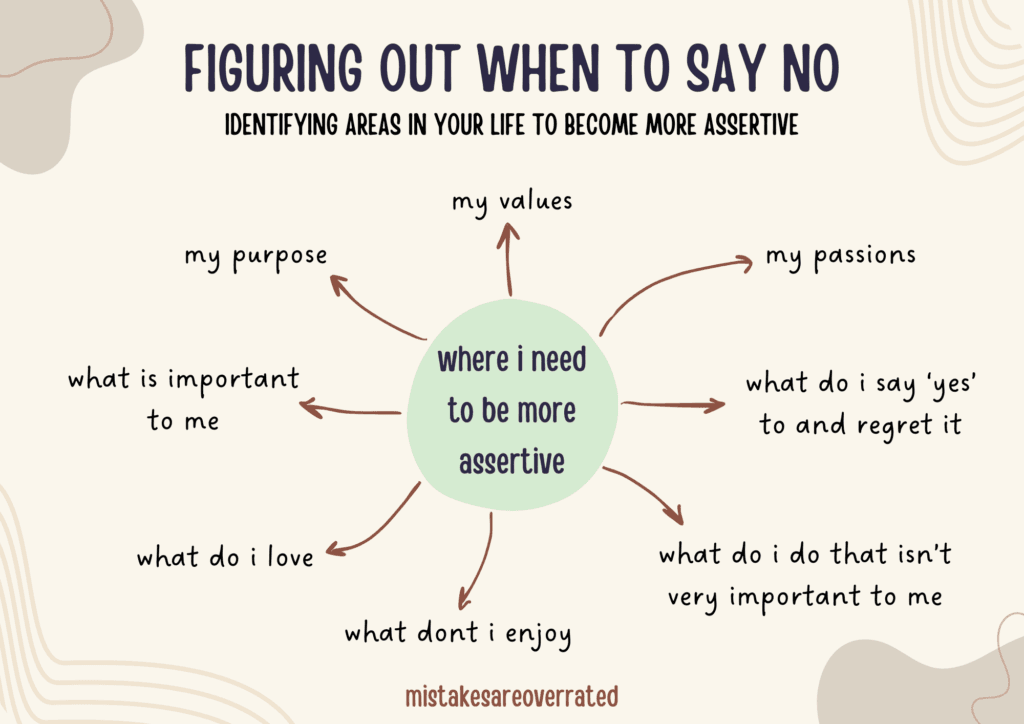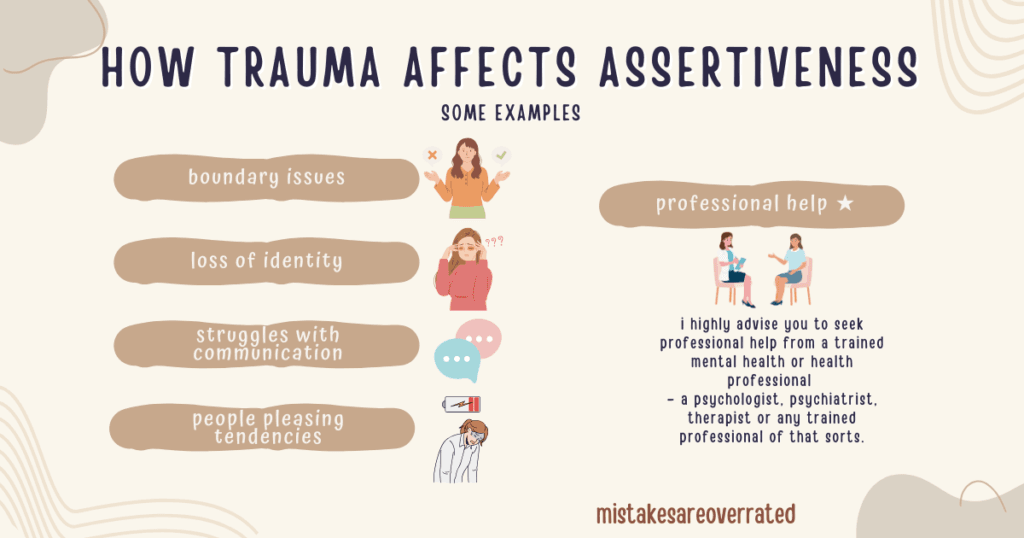being able to stand up for yourself is a necessary skill to hold in life.
it allows you to defend your self worth and not be pushed over by people.
assertiveness enables you to set boundaries in a confident and respectful manner whilst effectively expressing yourself.
– express your true authentic self, your emotions, opinions, feelings, beliefs and thoughts.
i can’t stress the importance of this skill, as it is so so sooo essential to look out for your well being.
the best thing is, assertiveness is a skill anyone can learn!!
assertiveness is a skill
you mustttt create a balance.
no-one wants to be too assertive – as you may come off being too dominant, where others may feel like they can’t get their point across
(commonly known as aggressive).
but then you also need to hold some assertiveness, as you don’t want others to not take you seriously and be a push over
(commonly known as passive).
assertiveness forms around how you establish boundaries for yourself, and the people around you.
when you learn how to communicate your feelings properly, you may find you’re respected more.
and it may surprise you that people tend to be more receptive to you than what you may have imagined.
holding assertiveness allows you to stand up for what you truly want and believe in, whilst respecting yourself, your values and opinions.
i have an in-depth article on, how to find yourself after trauma, – here, if you are feeling abit lost or distant from yourself.
how does assertive communication help
being assertive is an important trait, as it is a core communication skill.

- stand up for your point of view and values, whilst communicating in a direct and honest manner,
(all while respecting the rights and beliefs of the people around you).
- clearly communicate what you want, without feeling guilty for wanting it.
- avoid a burnout as you’re setting boundaries to protect your time and energy.
- improves your communication and overall wellbeing
- helps you manage any stress, and helps reduce conflict as you communicate in respectful ways
- tends to boost your self esteem, and help you feel empowered and confident in yourself.
- build positive relationships, as you can communicate effectively whilst being open and honest
- helps you achieve your goals
- can help improve your decision making skills
- it can positively improve your coping skills when recovering from trauma
- helps you build resilience by giving you permission to establish boundaries and stand up for yourself
learning to be more assertive was a necessity for me on my trauma healing journey.
how to improve assertiveness
okay, lets get into how you can learn the skill “assertiveness”, so you can begin to stand up for yourself in situations.
firstly, you must learn how to respect your opinions, aswell as the opinions of others surrounding you.
one thing you do not want to do is intentionally upset someone’s feelings, or seem unapproachable due to being too assertive.
you have the right to be treated with respect and have your voice heard, but it is also essential for you to learn from others.
in fact, i reckon being an observer is one of the best ways to learn.
you are able to pick up and learn particular details that you may have missed if you were actively participating in them.
just like you deserve to have your voice heard, others deserve their voices to be heard too.
listen attentively, and give the person your full attention.
if you can see it is important to them, then listen sincerely, as being heard is an extremely important feeling humans need to feel.
people will most likely respect you more after they have finished speaking when you listen to them sincerely and with enthusiasm.
sincerely and enthusiastically??
(what i mean is, don’t stare out into the distance or just have a blank face, actually engage with them and find interest in what they’re talking about).
a line i read that stuck with me was along the lines of, “if you want to be the best communicator, then you must be the best listener“.
it is also the same if you’re turned away or rejected.
yes, you may feel pain or betrayal in the moment of rejection, but don’t let it effect your self confidence or worth.
try to focus on the lessons you can take from it, and use it as fuel for your personal growth.
quick recap
-> respect your opinions and the opinions of others
-> attentive and active listener
-> rejection is just an opinion, don’t let it affect your self worth or confidence – use it as fuel for personal improvement and growth

being assertive in social settings
feel like you lack assertiveness in social settings?
being a plus one to a party and struggle to attract and talk to new friends, or out at a bar and unsure how to begin a conversation with a stranger.
be willing to put yourself in situations that are out of your comfort zone – even if you feel uncomfortable.
when you feel uncomfortable, instead of getting out of it by turning around, say to yourself “i will try this”.
*please note: when i say uncomfortable situations, i do not mean situations where you feel unsafe or uncomfortable in a bad way.
i mean the feeling of discomfort because it’s new to you, or because it isn’t in your usual routine.
i think this is beneficial for getting past this lack of assertiveness, as discomfort is a sign that we’re learning and growing.
example: i was at the library doing my usual work when an announcement said “in 5 minutes a 30 minute meditation is commencing”.
i love mediation so i walked to the room, but i started to feel really uncomfortable as it was a group of people i didn’t know.
as i reached the door everything in me told me to turn away, but i pushed through that discomfort and participated in the meditation and i loved it!
you must take control of your life, and in this aspect, your social life.
introduce yourself to others – whether its a new club, an event, friend group, or just out and about.
-> wear a warm smile, ask about their passions and interests, show genuine sincere interest in them, and and be open to their opinions.
make sure to keep the conversation alive with sentences, not one worded answers.
you must open yourself up to others by asking them about theirself and actively listen when they talk.
slowly practise being honest and clear about your needs, opinions, thoughts and feelings.
please don’t keep your values hidden within you, or assume others can read your mind.
most people mainly care about theirself and focus on what they’re saying or how they look,
so you may find it’s alot easier to speak your truth than what you had built up in your head.
be your true self
you must stay true to yourself whilst on your journey to learning to be more assertive.
by doing so, you will begin to love yourself more and more, and so will the people you are surrounded by.
filling your life with the things you enjoy, will make your life more pleasurable and enjoyable.
doing things that you genuinely love and find fun, will bring happiness into your life and, surprise surprise, make you happy!
begin to create a life you enjoy. live life for yourself.
when you feel more in control of your life, you may feel more comfortable to stand up for yourself and what you believe in and love.
stay true to yourself deep within your core, and do not be afraid to show your authentic, unique self.
(journaling really helped me find parts of myself that i lost after trauma, and its helpful for creating an action plan to become more assertive!)
body language
words can describe how you’re feeling, but language can prove otherwise.
you must speak through your body language.
infact, apparently around 80% of what people understand in a conversation is actually read through the body, not the words that were said.
how you present yourself when you speak to others can have an impact on your assertiveness.
– slouching your shoulders instead of having them back, may make you come off as passive to people.
or
– keeping your arms folded over your chest or getting in peoples personal space, may make you come off as a tad aggressive to people.
i found that maintaining eye contact is very important,
(not in a scary, i’m going to stare into your soul and not look away kind of eye contact),
but in an ‘i am fully engaged and listening to what you’re saying. i am not distracted’ kind of eye contact.
when you maintain eye contact, don’t be all stiff and frozen during the conversation.
ideally you want to make people feel comfortable around you, and to seem approachable so they can be open with you.
it can be as simple as nodding, smiling and showing sincere facial expressions during the conversation.
the other person can notice you’re actually listening to them and staying engaged.
your nonverbal communication should speak with confidence.
these small steps are a great gateway to practise being assertive, until you feel confident enough to take bigger steps.
learn when to say no
please remember, your time is valuable, and your energy is unmatched.
sometimes we say ‘yes’ out of fear we may lose friends or respect, if we were to say no.
but when you say no, you’re creating healthy boundaries with the people around you.
you’re making it clear to those around you what to expect from you, whilst protecting your valuable energy, time and peace.
how to know when to say no?

when i was learning to be more assertive, i journaled to identify areas in my life to practise saying no, and created a list.
-> identify what is important to you – your values, passions, purpose and what you love
-> acknowledge and accept what you don’t enjoy and isn’t as important to you, even if everyone around you enjoys it
this can give you an indication where to spend your time, energy and attention, and areas to say ‘no’ in.
when you’re first beginning to say no, it may make you feel strange inside as you’re going against what you usually do.
for me, learning to say ‘no’ when being asked on the spot was difficult, so to make it abit easier, i thought about these 3 things –
ask yourself these questions
- do you actually enjoy what is being asked of you?
- if you genuinely have the time to do it,
- if you like the company surrounding you.
when learning to say no and establish boundaries, please don’t focus on how others perceive and respect you.
focus on why you’re respecting yourself and being assertive (this is especially important when it feels uncomfortable to say no).
clearly communicate what you enjoy and feel comfortable with, and what you don’t particularly want to do or don’t feel comfortable with.
this way you’re opening up opportunities for you to say yes to things that make you genuinely happy and/or help you achieve your goals.
also, please don’t keep putting off saying no for the first time.
procrastinating practising being assertive, or setting your boundaries, is only a short-term stress response, it won’t benefit you in the future.
assertiveness and establishing boundaries is an extremely powerful step for your overall mental health.
you will feel in control of your life, as you’re choosing how to spend your time and what to put your energy into
(this is a huge step in personal growth).
for example – if you have an assignment due tomorrow and you still have a lot to do, but your friend group just asked to go out for dinner and drinks.
you need to make the decision that if you were to go, you will be stressed to get your assignment done on time – yes you may get fomo, but you saying you can’t go to your friends won’t impact your friendship.
how to say no to people
when you know when to say no, you need to learn how to say no.
now, you may feel abit guilty when you say no, and that is completely normal at first (well it sure was for me!)
if you are really struggling with saying no, think of it as
‘you saying no is an opening for letting someone else say yes’
it can ease your guilt abit.
“i” statements helped me immensely when i began to be more assertive.
i found “i” statements allows you to speak your thoughts and feelings in a way without sounding accusatory to the other person.
simply begin your sentence with “i”.
“i feel ___ when ___. i would appreciate it if ___”
or like,
“i completely understand, but i think ____ because ____”
i journaled to prepare my “i” statements, to help myself feel confident and not too overwhelmed.
i analysed the setting, the people and the situation, to prepare myself before taking action when i was beginning to be assertive.
with practise, before you know it, you won’t have to prepare yourself anymore as it will flow out of you freely.
when being assertive, please remember;
-> be kind and respectful
this one can be obvious, but sometimes after a while of saying no, we can be so caught up in our boundaries, that we actually become a bit selfish.
make sure you’re still considering the needs and wants of other people.
-> be direct and say what you mean clearly, but say it without being rude.
just remember what the people around you do for you, and make sure you go out of your way to repay them.
also when you do say no, be kind about it – by being gentle with your words.
-> be appreciative.
remember that the person is human, so they have feelings too.
make sure you show appreciation to what they’re saying or asking.
-> apologise if need be and be honest.
i know it is sssooo tempting to make up excuses for why you don’t want to do something, but be honest.
you must be mindful to make sure you don’t hurt anyone’s feelings.
-> make sure to stay true to your words after you have set boundaries, or spoken up about your needs, opinions or beliefs.
hold confidence when you stand up for your beliefs, even when other people disagree.
do not go back on your word as you’re reinforcing trust within yourself that you did the right thing for you.
-> please be prepared to miss out on activities, functions, get-togethers, ect.
as you’re establishing where you put your energy and time, you may feel you’re “missing out”, but remind yourself of why you said ‘no’.
how does trauma impact communication

trauma can have a direct or indirect impact on how we communicate to ourselves and others.
trauma can affect our communication in ways that look like;
- boundary issues
trauma can sometimes unconsciously set rigid boundaries within us, or make it difficult for us to say “no” to others.
this can make it hard for us to set healthy boundaries, or to stand up for ourself.
- loss of identity
a direct impact trauma had on me was with my identity.
i felt like a completely different person to who i once was and this was extremely confusing and lonely.
sometimes you don’t know where or even what your boundaries are, making it difficult for you to stand up for yourself.
- people pleasing tendencies
trauma may cause you to become a people pleaser or fawn over people, in attempt to minimise conflict or gain approval from other.
this can look like;
saying ‘yes’ when you want to say ‘no’,
taking on more responsibility than you can handle,
or not speak your mind and just agreeing to what others say.
- cause struggles with your communication
trauma can sometimes make it difficult for us to communicate with others.
due to a lack of trust, difficulty opening up to others and being vulnerable, or struggle expressing your true feelings, thoughts and opinions.
please note that your trauma healing journey is a process and personal to you.
all the information and strategies i am providing you is purely from personal experience.
i am not a professional and the contents in this article are solely for general and informational purposes.
i highly advise you to seek professional help from a trained mental health or health professional if you need
– a psychologist, psychiatrist, therapist or any trained professional of that sorts
your journey
you need to discover what works for you through personal experiments and experience.
you shouldn’t go through life just blindly abiding the advice from authorities,
you need to find out what works for you – because what works for them may not necessarily work for you.
it may be uncomfortable or daunting, or even make you feel awkward at first,
(well for me it did, and i am still currently working on my assertiveness in certain aspects of my life).
but start small, stay consistent and continue practicing – it will slowly become more natural to you.
setting boundaries truly changed my life and the way i view myself.
i am now more confident in the person i am and my mental wellbeing has improved immensely.
saying no, being more assertive and setting boundaries when needed, have helped me grow so so much.
i am able to create more time in my week to practise self care, and engage in self improvement activities
i hope something in this article sticks with you and makes you want to begin your journey to becoming more assertive.
-MAO <33
don’t give trauma the power to control you, you deserve to live how you want. take control of your trauma.
-life advice from one survivor to another
feel free to get anything off your chest <3
request a topic, tell your story, have any current struggles, or if you have any questions.
you are amazing 🤍

Leave a Reply